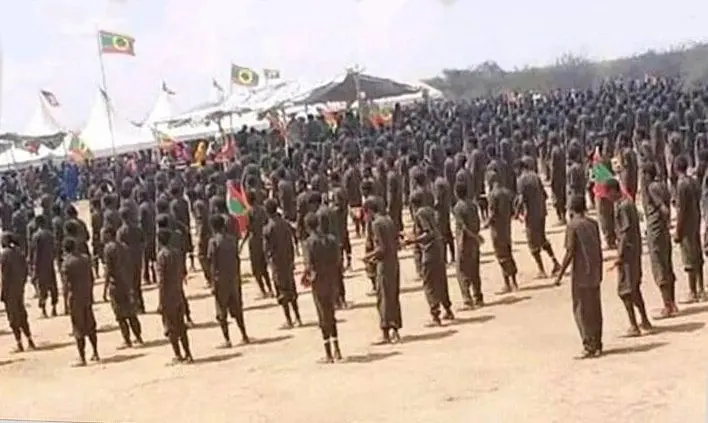In the heart of Africa, where vibrant cultures and diverse communities have thrived for centuries, a silent nightmare unfolds. The Amhara Genocide, a brutal and horrific episode in Ethiopia’s history, remains largely obscured from international view. Yet, beneath this shroud of silence lies a chilling narrative of unfathomable suffering, mass killings, and ethnic violence.
Historical Context and “Abyssinia: The Powder Barrel”
To truly understand the Amhara Genocide, we must delve into the annals of history, tracing back to a time when Ethiopia faced external threats and attempts at colonization. One of the most pivotal moments in this history was the Battle of Adwa in 1896 when Emperor Menelik II’s forces successfully resisted Italian colonization efforts. However, these events laid the groundwork for a troubling legacy of ethnic tensions and division.
During this era, strategies aimed at creating ethnic discord were proposed, notably outlined in the book “Abyssinia: The Powder Barrel.” This insidious playbook sought to portray the Amhara people as oppressors of other ethnic groups, with the intent of sowing the seeds of division within Ethiopia.
Minilikawuyan Misuse
Fast forward to today, and we witness a disturbing resurgence of historical tactics in Ethiopia. Elements within the federal defence force and government authorities, along with other perpetrators, have resurrected the term “Minilikawuyan” to falsely label the Amhara population as oppressors. This false narrative, initially suggested by the Italians in the book “Abyssinia: The Powder Barrel” and subsequently propagated through divisive missionary efforts, has been tragically misused to justify violence against innocent Amharas.
It is essential to clarify that Amharas bear no historical responsibility for acts of oppression. This narrative is a distortion of historical facts, serving as a pretext for the current violence against Amhara individuals who are often impoverished farmers living in dire circumstances.
The Horrors Unleashed
Imagine a land where communities once coexisted harmoniously, now torn apart by a wave of violence that shows no mercy. Children, women, and men have fallen victim to acts of unimaginable brutality, their lives extinguished for no reason other than their ethnicity.
The perpetrators of this genocide, emboldened by a twisted historical narrative, employ derogatory terms such as “Neftegna,” “Minilikawiyans,” “jawisa,” and “donkeys” to dehumanize and vilify the Amhara people. Such degrading language has become a weapon, used to justify the unspeakable atrocities being committed.
A World Turning a Blind Eye
The shocking truth is that, despite the scale of these atrocities and the blatant misuse of historical narratives to fuel the violence, the international community has largely chosen to remain silent, stopping short of calling it what it is: genocide. This hesitation threatens to embolden the perpetrators and erodes the hope of justice for the victims.
The world has a painful history of reluctance when it comes to intervening in genocides. Rwanda and Bosnia are stark reminders of what happens when the international community fails to act decisively. The consequences are devastating, leading to the loss of countless lives.
As we unmask the horrors of the Amhara Genocide, we are left with an unsettling question: How can a genocidal government serve as the prosecutor, the judge, and the legal instrument of its own persecution? The world must not allow this haunting paradox to continue. Immediate action is not only a moral imperative but also a duty to humanity.
Breaking the Chains of Silence
It’s time for the world to shatter the silence enveloping the Amhara Genocide. We must confront the stark and irrefutable truth: what’s happening in Ethiopia is indeed genocide. This term carries a moral imperative, a call to action that cannot be ignored. It reminds us of the promise of “never again,” a vow to prevent such horrors from recurring.
A Path Forward: A Comprehensive Transitional Government
To address the Amhara Genocide comprehensively, we propose the establishment of a transitional government in Ethiopia. This body should comprise individuals unwavering in their commitment to justice, reconciliation, and the protection of human rights. Importantly, political parties suspected of involvement in the genocide, or found guilty, must be banned from all political activities and brought to justice. This ensures that the guilty face accountability, while the innocent can eventually resume political activities once cleared.
A Plea for Action
The Amhara Genocide serves as a somber reminder of our collective responsibility to protect innocent lives and prevent the recurrence of such horrors. Condemnation alone won’t suffice; immediate and decisive action is imperative.
The Genocide Convention: A Moral Imperative
The Genocide Convention, adopted by the United Nations in 1948, outlines the international community’s obligation to prevent and punish acts of genocide. It defines genocide as “acts committed with intent to destroy, in whole or in part, a national, ethnical, racial, or religious group.” The Amhara Genocide unequivocally falls within this definition.
The international community’s silence or reluctance to label it as such is a disheartening deviation from the principles enshrined in the Genocide Convention. The moral imperative of the convention is clear: the world must act decisively to prevent the ongoing atrocities against the Amhara people.
Transitional Justice: A Path to Healing
Transitional justice, as outlined by the United Nations, seeks to address the legacies of massive human rights abuses. In the case of the Amhara Genocide, it becomes not just a necessity but a lifeline for healing a deeply wounded nation.
In considering the path forward for Ethiopia, it becomes abundantly clear that the current government, implicated in the perpetration of the Amhara Genocide, cannot be entrusted with the responsibility of ending this humanitarian crisis, bringing accountability to the guilty parties, and fostering reconciliation and peace. The very actors who bear responsibility for these heinous acts cannot credibly lead a process of transitional justice. Their continued presence in power poses an imminent threat to the victims, who remain in grave danger. The risk of further violence, silencing of witnesses, and targeted killings looms large as long as those responsible for the genocide retain control. The concept of “quasi-compliance” comes into play, where there may be a semblance of cooperation with international efforts, but the underlying structures of power and impunity remain intact, rendering any transitional justice process ineffective and potentially even more harmful to the victims. A truly impartial and comprehensive transitional government, as well as international oversight, is imperative to ensure that justice prevails and a lasting peace can be achieved in Ethiopia and the wider region.
A comprehensive transitional government, composed of impartial figures committed to justice and reconciliation, can pave the way for this much-needed healing. It must prioritize:
- Truth: Before accountability can be achieved, the full scope of the atrocities and the historical context that led to them must be unveiled. A comprehensive truth-seeking process is vital for acknowledging the suffering of the victims and understanding the factors that fueled the Amhara Genocide.
- Accountability: Perpetrators, regardless of their affiliation, must be brought to justice. A clear message must be sent that impunity will not be tolerated.
- Restitution: Victims of the Amhara Genocide deserve restitution for their suffering. This includes not only material compensation but also support for psychological and emotional recovery.
- Reconciliation: Rebuilding trust between communities, many of which have been torn apart by this violence, is paramount. Initiatives that foster understanding and cooperation must be central to the transitional government’s agenda.
In conclusion, we earnestly call upon the international community to:
- Publicly acknowledge the Amhara Genocide as genocide, underscoring the need for immediate intervention.
- Extend support for the formation of a comprehensive transitional government in Ethiopia, led by impartial figures dedicated to justice and reconciliation.
- Impose a ban on all political parties connected to the genocide until they are cleared of wrongdoing.
- Provide urgent humanitarian aid to the victims of the Amhara Genocide, addressing their immediate needs.
- Forge collaborations with international partners and organizations to ensure justice, restitution, and reconciliation are achieved effectively and enduringly.
Ethiopia, like the phoenix, must rise from the ashes of this dark chapter in its history. By collectively committing to justice, reconciliation, and the safeguarding of human rights, we can hope for a future where unity and peace reign supreme. It’s time for the world to heed the lessons of history and prevent another tragic chapter from being written.







